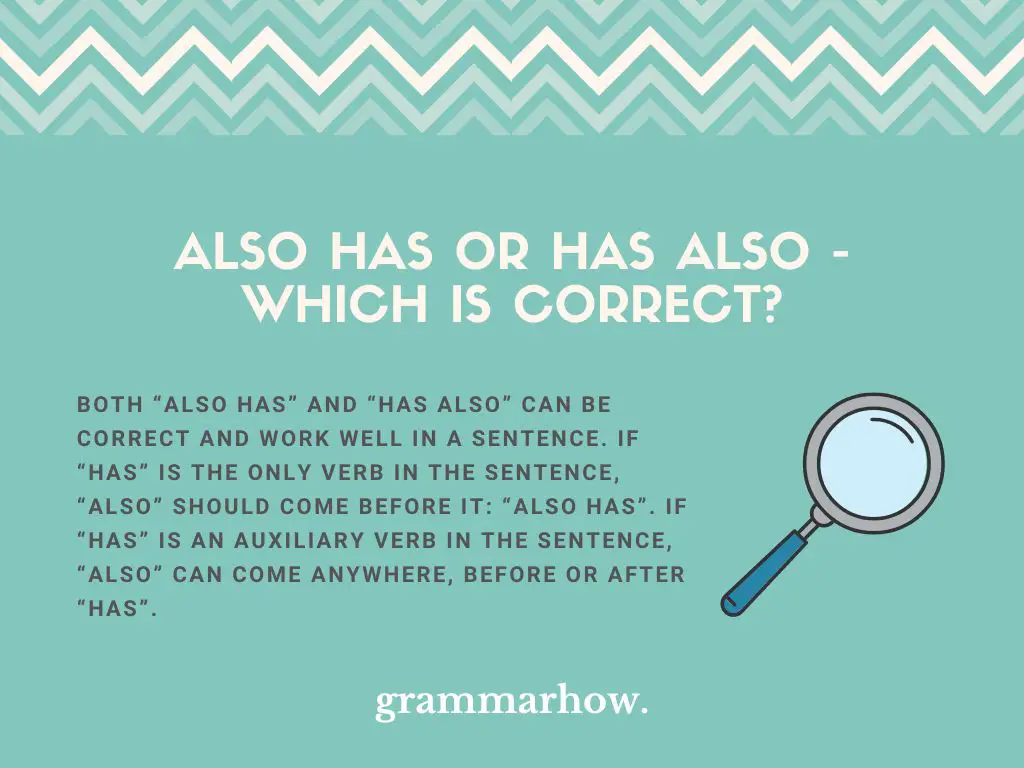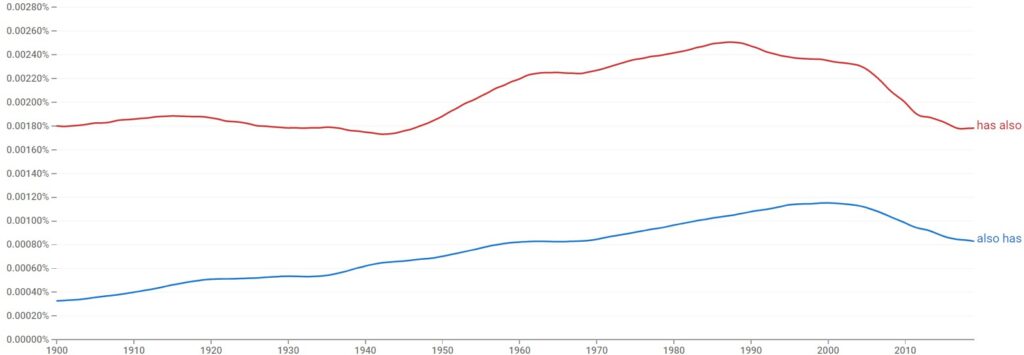“Has” is a versatile word. It can appear in many ways, sometimes even changing the meaning of the sentence or affecting the message we’re trying to convey.
When it comes to “Also Has” and “Has Also”, does it make a difference if we change the order of the words?
Also Has or Has Also – Which Is Correct?
Both “Also Has” and “Has Also” can be correct and work well in a sentence. If “Has” is the only verb in the sentence, “Also” should come before it: “Also Has”. If “Has” is an auxiliary verb in the sentence, “Also” can come anywhere, before or after “Has”.

Take a look at some examples we’ve prepared:
- Sam also has to go.
- Sam has also to go. (incorrect)
- Sam has also been to this restaurant.
- Sam also has been to this restaurant.
In the first set of examples, we’re sharing a simple information: Sam has to go. In this case, “Has” is the only verb in the sentence. In this scenario, “Also Has” works well, while “Has Also” sounds weird. Have you tried to read the second sentence out loud?
In the second set of examples, “Has” is an auxiliary verb. As we share that Sam’s been to a certain restaurant, both “Has Also” and “Also Has” work perfectly fine. In that scenario, you can use any of the two, according to your personal style and preference.
Also Has
“Also Has” should be used in that order – “Also” before “Has” – whenever “Has” is the only verb in the sentence. When “Has” is used as an auxiliary verb, this principle doesn’t work.
Take a look at the examples of “Also Has” at work, when “Has” is the only verb in the sentence:
- Paula also has to work tomorrow.
- John also has been sick recently. What’s going on?
- Manuella also has been out all day, with her friends.
- Jim also has a coffee mug like that.
- My boss also has a conference next week.
In most cases, using “Has Also” in the sentences above (instead of “Also Has”) would make it sound grammatically incorrect and weird. Have you tried to make that change and see how the sentences look?
For example, using sentence 1’s example: “Paula has also to work tomorrow.” It doesn’t sound like an organic sentence we’d use in our daily conversations, does it?
Has Also
“Has Also” should be used with that form – “Also” after “Has” – whenever “Has” is operating as an auxiliary verb, in a Present Perfect or Past Perfect situation. Keep in mind that “Also Has” can work well in that scenario too. It means you can choose the form you like best.
Take a look at some examples of “Has Also” at work:
- Dan has also been to Greece.
- Dan also has been to Greece.
- I think Marissa has also been here earlier, because her room is a mess.
- I think Marissa also has been here earlier, because her room is a mess.
- Kyle has also seen this band live, and he said it was great.
- Karen has also had a job like this for a while.
- Ron has also visited the Louvre Museum, while in Paris.
For sentences 1 and 3 we added, right next to them (numbered as sentences 2 and 4) the same content using “Also Has” instead of “Has Also”.
It’s clear that both forms would work to convey the same message, indicating that in your own sentences you can choose to use the one you’re more comfortable with.
Which Is Used the Most?
Do you think people use “Also Has” or “Has Also” more often? Take a look at the graph from Google Ngram Viewer below, to find the answer to this question.

“Has Also” is used with more frequency than “Also Has”. The difference is actually considerable, and that’s been the case throughout the years.
But it’s also interesting to notice that both expressions have followed the same trend all along. When the usage for one grows, the other follows. When the usage for the other drops, the first follows. They seem to be attached, somehow.
Final Thoughts
The rule to use “Has Also” and “Also Has” is fairly simple. Use “Also Has” when “Has” is the only verb in the sentence. Use any of the forms (“Has Also” or “Also Has”) when “Has” is being used as an auxiliary verb, along with another verb.
You may also like:
Was Also or Also Was – Which Is Correct? (Helpful Examples)
Is Also or Also Is – Which Is Correct? (Helpful Examples)
Also Have or Have Also – Which Is Correct? (Helpful Examples)

Martin holds a Master’s degree in Finance and International Business. He has six years of experience in professional communication with clients, executives, and colleagues. Furthermore, he has teaching experience from Aarhus University. Martin has been featured as an expert in communication and teaching on Forbes and Shopify. Read more about Martin here.

